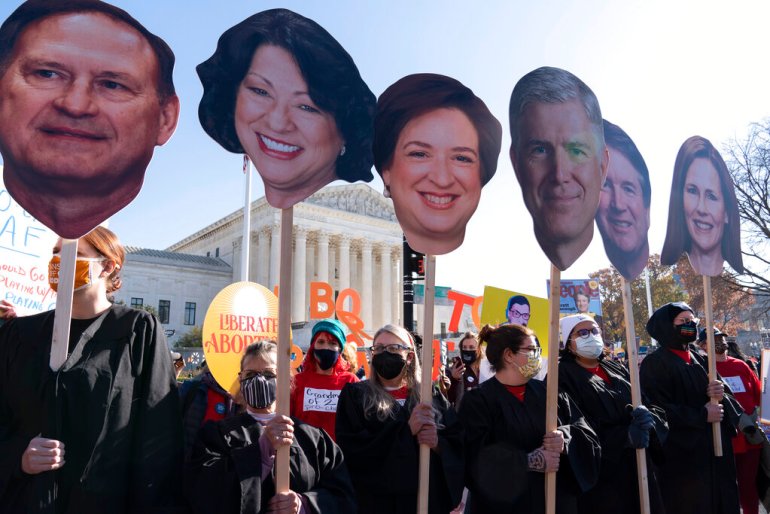Michigan governor sues to secure abortion rights, vacate old law
With the US Supreme Court potentially overturning Roe v Wade, Michigan’s governor seeks the removal of the state’s 1846 abortion ban.

Michigan Governor Gretchen Whitmer asked a Michigan court on Thursday to recognise a right to abortion under the state constitution and overturn a 176-year-old state ban that may take effect if a landmark United States ruling is overturned.
The Democratic governor’s pre-emptive lawsuit, filed in Oakland County against prosecutors in 13 Michigan counties with an abortion clinic, came as the US Supreme Court considers allowing states to ban abortion much earlier in pregnancy and potentially overturning the right.
Keep reading
list of 4 itemsBarrett takes US Supreme Court oath, deepening conservative grip
Brett Kavanaugh sworn in as US Supreme Court justice
The US war on abortion rights will harm women everywhere
Planned Parenthood of Michigan and its chief medical officer filed a similar suit in the state Court of Claims to block enforcement of the 1931 law, which dates to an 1846 ban. With the old law still on its books, Michigan is one of 28 US states that would ban or be likely to ban abortions if the US Supreme Court reverses its 1973 ruling in Roe v Wade legalising abortion rights nationwide.
Whitmer was expected to request that the Michigan Supreme Court quickly take her case rather than let it wind through lower trial and appellate courts. A favourable decision in Whitmer’s case would allow abortions to continue in Michigan even if the top federal court reverses Roe v Wade.
“It was important for us to take action now, to ensure that women and providers across the state of Michigan know whether abortions will still be available in the state because it impacts their lives and our healthcare providers’ practices,” Whitmer told The Associated Press, saying nearly 2.2 million women may lose access to a safe, legal medical procedure.
“It’s crucial that we take this action now to secure and ensure that the Michigan Constitution protects this right that we have had available for 49 years,” she said.
Michigan’s unenforced abortion ban was enacted before the 1973 Roe decision that legalised abortion. States on both sides of the abortion issue have been taking a variety of steps to prepare for Roe being eroded or rescinded, including making it a crime to perform an abortion or banning legal action against people who aid or receive an abortion.
Michigan’s law makes it a felony to use an instrument or administer any substance with the intent “to procure the miscarriage” of a woman unless necessary to preserve her life.

Whitmer wants the Michigan Supreme Court to declare a state constitutional right to abortion and to strike down the 1931 law, a near total ban that the governor called “one of the most extreme laws in the country”.
Her lawsuit argues that the law is invalid under the due process and equal protection clauses of the state constitution. Calls to repeal the law have gone nowhere in the Republican-controlled Michigan Legislature.
Whitmer will ask that the court intervene in part to avoid legal uncertainty when the federal high court issues its ruling on Mississippi’s ban on abortions after 15 weeks of pregnancy.
The complaint says that while the Michigan Supreme Court in 1973 ruled that Roe limited the effect of the state ban, the right to abortion has been undermined over 50 years of litigation in federal courts. The Michigan Court of Appeals ruled in 1997 that there is no constitutional right to abortion, but the state’s high court has never ruled on the question.

Abortion rights advocates in Michigan have launched a ballot drive to enshrine the right to abortion in the state constitution,s but need about 425,000 voter signatures to put the initiative up to a vote in November.
Meanwhile, seven Democratic county prosecutors who were named in Whitmer’s lawsuit pledged to not enforce the anti-abortion law. The other six elected prosecutors named are Republicans.
“We cannot and will not support criminalizing reproductive freedom or creating unsafe, untenable situations for healthcare providers and those who seek abortions in our communities,” said a joint statement from the elected prosecutors of Michigan’s Wayne, Oakland, Genesee, Washtenaw, Ingham, Kalamazoo, and Marquette counties.
“Instead, we will continue to dedicate our limited resources towards the prosecution of serious crimes and the pursuit of justice for all.”
Whitmer’s case will be decided by four Democratic and three Republican justices on the state high court.